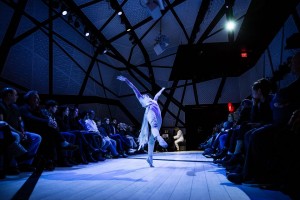"The Classical Voice" reviews Latency directed and composed by Sxip Shirey with choreography by Coco Karol

He proved that second precept in the opening work, The Gauntlet: Sing me a Lullaby, as Under Water. Two rows of chairs lined either side of a long strip of floor, forming a riverbed. Singers from the volunteer choir of new-music enthusiasts Choral Chameleon stood on low footstools along the inner rows of chairs, leaving just enough room for audience members to pass between them, a head lower than the singers.
Every few seconds, Shirey fed a word or two of sung poetry to the nearest chorister, who then "handed" it to a colleague, literally leaning forward, hands outstretched as he or she sang it, with the other singer reaching out first to take it and then again to offer it onward. As the audience walked through, the mish-mash of musical fragments flowing around us did give the sense of being underwater. But even more striking was the physical sensation of gracefully stretching arms and fingers everywhere, like blades of kelp rippling in a current.
In Latency, an Elegy for David Bowie, Shirey wrote a eulogy to the British rock icon, another artist who understood how much play lies at the root of music-making. Inspired by the image of "Bowie's soul waiting for his voice to catch up to him," the composer focused on the principle of delay. He and dancer/choreographer Coco Karol sang into cellphones, and their voices re-emerged moments later, smaller and distorted, on the other's device. This communication grew faster and faster and the performers closer and closer, until the phones were passing beeps back and forth on their own like an alien language (something else Bowie would have appreciated).
"Amelia Found" was a haunting evocation of things that have disappeared from our lives.
The next phase of the piece journeyed effectively back and forth between the joy of play and the sadness of loss. Shirey, along with singers Rima Fand and Lacy Rose, sang a poignant lyric that began "You were on the radio," often using Shirey's favorite medieval technique, hocketing, to pass musical phrases person to person, note by note. The delayed amplification of falling and rolling marbles, vintage Fisher-Price Melody Push Pull toys, and long-spinning weight plates reminded us of the serious fun of building with sound.
Jonny Rogers coaxed celestial tones from the glass harmonica, lifting the music beyond this plane to a place where spirits might witness the proceedings. I have no doubt that Bowie's was among them.
It was clear that Amelia Found would be extraordinary when Lacy Rose tuned Shireya's grandfather's Morse code key machine to the F of the glass harmonica. Rose, who learned Morse code from her Vietnam vet father, operated that quiet, haunting F throughout the piece, spelling out the names of things and people that audience members had earlier identified as having disappeared from their lives.
The work gave Karol, costumed as a ghostly pilot, the full performance space to weave the story of Amelia Earharta's lonesome last voyage in spooky movements that capture flight, loss of control, and a kind of dissipation; as Shirey remarked, "She didna't die, she disappeared." Rogers played glass harmonica at one end of the room and Shirey rolled and arpeggiated piano chords (in an acknowledged tribute to Debussy) on the other.
Perhaps to represent the downing of the airplane or the shift into an ethereal existence, puppeteer Basil Twist wielded a massive crimson banner on a staff, twisting it until it billowed into heaven-bound structures. Then puppeteers Chris Green and Erin Orrfollowed, causing delicate wooden birds with propeller wings to dance and swoop like the pilota's untethered spirit.
All the while, in those ceaseless bursts of F, the Morse code key never stopped trying to reach all the things we've lost.
Anne E. Johnson is a freelance writer based in Brooklyn. Her arts journalism has appeared in The New York Times, Classical Voice North America, Chicago On the Aisle, and Copper: The Journal of Music and Audio. For many years she taught music history and theory in the Extension Division of Mannes School of Music.
URL: < https://classicalvoiceamerica.org/2018/01/18/four-wild-nights-in-a-brooklyn-music-incubator/ >

